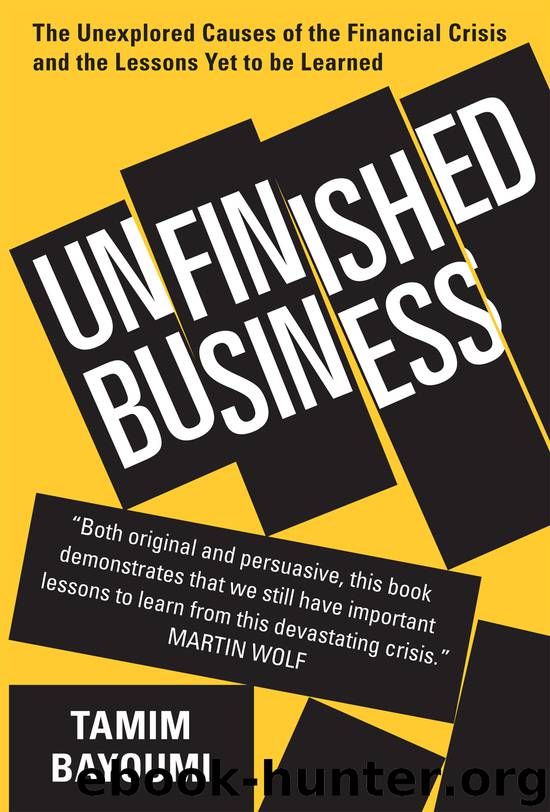Unfinished Business: The Unexplored Causes of the Financial Crisis and the Lessons Yet to Be Learned by Tamim Bayoumi

Author:Tamim Bayoumi [Bayoumi, Tamim]
Language: eng
Format: epub
ISBN: 9780300225631
Google: StA1DwAAQBAJ
Amazon: 0300225636
Publisher: Yale University Press
Published: 2017-01-15T00:40:25.839000+00:00
Chapter 6
A HISTORY OF THE INTERNATIONAL MONETARY SYSTEM IN FIVE CRISES
A strong belief in the virtues of open global capital markets amplified and—in particular—globalized the costs of the North Atlantic crisis. As discussed previously, outflows from the core Euro area banks helped feed growing housing and financial bubbles in the United States and the periphery of the Euro area over the 2000s. By pumping more oxygen into the system, this financing amplified the bubbles and the associated losses when they burst. In addition to generating deep recessions, the financial turmoil blew back onto the undercapitalized banks in the Euro area core, widening the collapse in output to the entire North Atlantic region. And it did not stop there. The recession rapidly became global, as investors withdrew indiscriminately from risky assets regardless of where they were located and global trade was battered by a sudden stop in spending on investment and durable goods as well as a drying up of trade finance—a segment of the market where the European mega-banks had become dominant. The retreat from international finance generated a global recession.
The strong support for open international capital flows among North Atlantic policymakers was linked to the growing belief that financial markets were self-regulating and stable. Financial globalization was seen as smoothly funneling money around the world as savers seeking the highest returns (adjusted for risk) channeled money into the most productive investments. Indeed, international investors were seen as providing welcome discipline to national policymakers as they would ferret out unwise policies and gradually stiffen borrowing terms, providing increasing incentives for policymakers to pursue a more advisable course.
The belief in the benefits of free international capital flows was by no means universal, with emerging market policymakers, in particular, often questioning them. Rather than the smooth and efficient system envisaged in theory, emerging markets had been battered by a series of crises in which foreign money had first flooded into their economies and then even more swiftly ebbed away. The largest of these events was the Asian crisis of the late 1990s which started in Thailand but quickly spread to Indonesia, Korea, Malaysia, and even Hong Kong. North Atlantic policymakers, however, generally ascribed this instability to the less developed financial systems and policy regimes of the recipient countries. Emerging markets needed a policy upgrade to take full advantage of the benefits of global capital markets. The prevailing view in the United States and Europe was that the problem was not with global capital markets, but rather with the way that countries behaved within them.
Strikingly, this faith in the benefits of unfettered international debt flows has largely survived the crisis. There has been no wholesale reform of the international financial system in its wake. To be sure, funds available to the International Monetary Fund and similar regional bodies to combat crises have been boosted and there is somewhat more sympathy for countries using capital controls to limit the ebbs and flows of international money. However, the focus of post-crisis financial reforms has been squarely on improving domestic financial regulation.
Download
This site does not store any files on its server. We only index and link to content provided by other sites. Please contact the content providers to delete copyright contents if any and email us, we'll remove relevant links or contents immediately.
International Integration of the Brazilian Economy by Elias C. Grivoyannis(110907)
The Radium Girls by Kate Moore(12019)
Turbulence by E. J. Noyes(8040)
Nudge - Improving Decisions about Health, Wealth, and Happiness by Thaler Sunstein(7694)
The Black Swan by Nassim Nicholas Taleb(7113)
Rich Dad Poor Dad by Robert T. Kiyosaki(6613)
Pioneering Portfolio Management by David F. Swensen(6291)
Man-made Catastrophes and Risk Information Concealment by Dmitry Chernov & Didier Sornette(6009)
Zero to One by Peter Thiel(5789)
Secrecy World by Jake Bernstein(4743)
Millionaire: The Philanderer, Gambler, and Duelist Who Invented Modern Finance by Janet Gleeson(4471)
The Age of Surveillance Capitalism by Shoshana Zuboff(4279)
Skin in the Game by Nassim Nicholas Taleb(4240)
The Money Culture by Michael Lewis(4198)
Bullshit Jobs by David Graeber(4180)
Skin in the Game: Hidden Asymmetries in Daily Life by Nassim Nicholas Taleb(3993)
The Dhandho Investor by Mohnish Pabrai(3760)
The Wisdom of Finance by Mihir Desai(3735)
Blockchain Basics by Daniel Drescher(3574)
